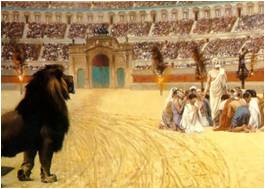 First and Second Peter are grouped in what are called the General Epistles, written to the Church at large. The theme of First Peter is the refining and growth potential in our sufferings, 1Pe 1:3, 1Pe 1:6; 1Pe 2:2. This epistle was written to believers scattered by persecution throughout Asia Minor (1 Pe 1:1). The date was circa 64-65 A.D.—the beginning of Nero’s persecutions. First Peter is the best known and loved of these epistles, called by E.J. Goodspeed, “One of the most moving pieces of persecution literature.” This epistle is written to suffering believers, and is styled by Isaac Walton as, “affectionate, loving, lowly, and humble.” This epistle conveys an intense expectation of the Lord’s return as seen in 1Pe 1:5, 1Pe 1:7, 1Pe 1:13, 1Pe 2:12, 1Pe 4:13, 1Pe 4:17, 1Pe 5:1, 1Pe 5:4.
First and Second Peter are grouped in what are called the General Epistles, written to the Church at large. The theme of First Peter is the refining and growth potential in our sufferings, 1Pe 1:3, 1Pe 1:6; 1Pe 2:2. This epistle was written to believers scattered by persecution throughout Asia Minor (1 Pe 1:1). The date was circa 64-65 A.D.—the beginning of Nero’s persecutions. First Peter is the best known and loved of these epistles, called by E.J. Goodspeed, “One of the most moving pieces of persecution literature.” This epistle is written to suffering believers, and is styled by Isaac Walton as, “affectionate, loving, lowly, and humble.” This epistle conveys an intense expectation of the Lord’s return as seen in 1Pe 1:5, 1Pe 1:7, 1Pe 1:13, 1Pe 2:12, 1Pe 4:13, 1Pe 4:17, 1Pe 5:1, 1Pe 5:4.
Gene Cunningham - October 26, 2003
Psalm 15 - Abiding With the Lord

Scripture References: Matthew 12:34, Philippians 2:9, Exodus 22:25, Ephesians 5:18, Romans 8:4, Psalms 31:1-2, Leviticus 25:36-37, Ephesians 3:17, James 2:17, Psalms 18:2, Romans 13:7, Hebrews 3:6, James 1:22, Matthew 1:23, Genesis 25:34, John 8:35, Psalms 15:2, Psalms 44:3, Leviticus 19:16-18, Isaiah 6:2, Matthew 22:37-39, Isaiah 53:1, Psalms 15:3-4, Hebrews 13:12-13, John 15:1-10, John 1:3, Psalms 89:18
From Series: "Psalms - 2001"
No Summary for this series yet.

